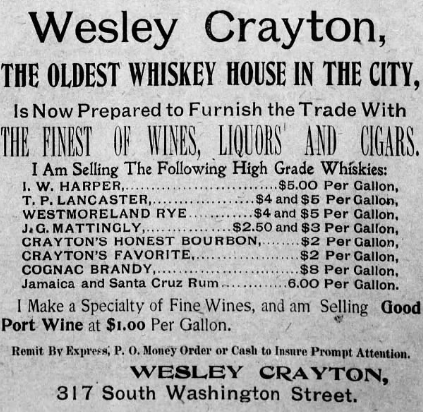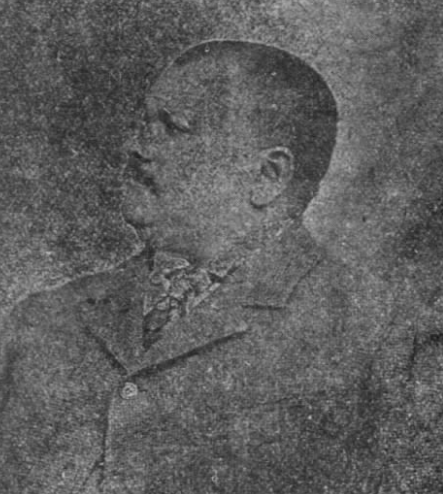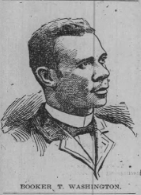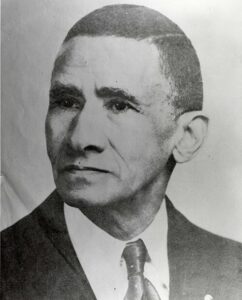Once upon a time in Black Entrepreneur History lived an African American man named Wesley Crayton who was noted as being “a Leader in Mississippi Business World” as a popular saloon owner and whiskey dealer as well as a respected politician, known as one of the wealthiest men in Mississippi.
Wesley Crayton was born in 1855 near Canton, Madison County, Mississippi, and it was when he was only sixteen years old, he moved to Vicksburg, Mississippi as a poor teenager with no money. However, he was determined to find a job and earn money to which he began working at a hotel. Working in a hotel was only a means to an end, however, because Crayton’s goal was to become his own boss. He wanted to become an entrepreneur, so he saved everything that he could save from his pay from the hotel which amounted to $50 dollars[1], equaling about $1500 today. From there, his mission was to achieve his goal.
Wesley Crayton’s Business Venture
There was a man named Joseph F. Doll, who later became Mayor-elect of the town of Vicksburg, that noticed the hardworking and goal oriented, 21 year old Crayton and decided to loan him the venture capital necessary to launch his business – a small saloon. The saloon started off very small, serving from what was a very small counter, but it didn’t remain that way. Soon, Crayton’s saloon had a workforce of as many as twelve African American employees, and the saloon became one of the largest and most successful in the town of Vicksburg, Mississippi. The saloon didn’t even collapse during the Panic of 1893 which was an economic depression covering the entire United States of America that lasted for four long years.

As seen in the Wesley Crayton’s ad from 1899, his business was located at 317 South Washington Street, and his saloon sold the oldest and finest spirits in the city of Vicksburg. His saloon – named Blue Light Saloon – was so accepting payments in several ways, so this added to the success of his business – successful marketing campaigns and a variety of payment methods. Not only did he serve spirits at his saloon, but also lunches for the patrons, and also provided fish and picnic parties on short notice.
In 1905 on June 19th, although his business was successful, Wesley Crayton declared bankruptcy as laws began changing about the sale of alcohol in the state of Mississippi, and many of those were pushing for the prohibition of alcohol as it pertains to African Americans and drinking in saloons, spreading the false belief that it would endanger white women. While other Christian organizations, both black and white thought it led to a breakdown of the family. Anyone found breaking the law could suffer jail time and fines by 1907-1908 when Mississippi prohibited all alcohol sales, and there followed a nationwide prohibition for a number of years.

Wesley Crayton’s Political Offices
Wesley Crayton, while being a highly successful businessman and saloon owner at a very young age, was also the town’s fourth ward alderman for five terms which is a total of ten years, being very instrumental in policies, programs, programs and ordinances in the area. Crayton was a member of the state Republican Executive Committee, and he became the only Black chairman of any national convention, representing the Third Congressional District in the Republican National Conventions, starting in the year 1880.
As far as his own home and finances, it was considered one of the nicest and most elegantly furnished homes, which was located on Lane Hill, and his finances were wealth, being a real estate investor and a very cushioned bank account. Mr. Booker T. Washington, in a report to the Delaware Gazette and State Journal of 1901, spoke of Mr. Wesley Crayton’s home as one of the larger evidences, among the other evidences, of Black people prospering in Mississippi. He is quoted as stating:
“In speaking of the improvements which has taken place, I must mention the case of a colored man in whose home I was entertained. It has been my privilege to see something of the homes of some of the best white people in every part of the North and West, and I do not exaggerate when I say I have seldom been in the home of any white man anywhere in the country where everything was so attractive, convenient and comfortable. I had not been in this home five minutes before the lady of the house asked me if I would not like to inspect her kitchen and pantry, and I found everything in the kitchen as neat and intelligently arranged as one would expect to find in a home in New England. I confess that this home is much above the average occupied by our people, but it is an indication of the progress that is being made. The owner of the home to which I refer is Mr. Wesley Crayton, who is a successful businessman in Vicksburg.”[2]
Delaware Gazette and State Journal, Wilmington, Delaware · Thursday, October 31, 1901
Wesley Crayton shared his life with his first wife named Henrietta Crayton who passed away in 1916 and he remarried in 1920. In the year that his first wife passed away, he’d suffered two strokes, slowing him down.
Wesley Crayton was also a member of many organizations such as being a Thirty Second Degree Mason, a Mystic Shriner, Knights Templar, Knight of Pythias and also an Odd Fellow. He also served as the vice president of two banking institutions as well as chairman of the Negro Business League of Vicksburg, as well as a musician and band founder – the Wesley Crayton Silver Cornet Band.[4]
Crayton supported all things that boosted African Americans because all forms of media and talk wanted to degrade them with harmful stereotypes. Therefore he was a very charitable man, giving to Black American causes and demanding the respect of Black citizens. Black Americans who knew him all around the state and nation would consider him one of the men to point out when others tried to degrade the race because they held him in high regard.
Wesley Crayton’s Death
Wesley Crayton passed away in his home at the age of 73 in the year 1924. At the end of his life, he was running a grocery store in his area and he’d been honored with a street named after him some years prior to his death on Bryson’s Hill.[5]
Sources:
- The Colored American, Washington, District of Columbia · Saturday, April 05, 1902
- Delaware Gazette and State Journal, Wilmington, Delaware · Thursday, October 31, 1901
- Vicksburg Dispatch, Vicksburg, Mississippi · Saturday, December 16, 1899 (Pic)
- Mississippi Encyclopedia, mississippiencyclopedia.org
- The Vicksburg Post, Vicksburg, Mississippi · Saturday, November 29, 1924





More Related Stories
Isaac Scott Hathaway – Founder of Isaac Hathaway Art Company & Designer of First African American Coin
James Wormley – Founder of the Most Expensive Hotel in Washington D.C. in 1800s – the Wormley Hotel
William E. Matthews – Wealthy Financial Broker & Civil Rights Leader of 1800s